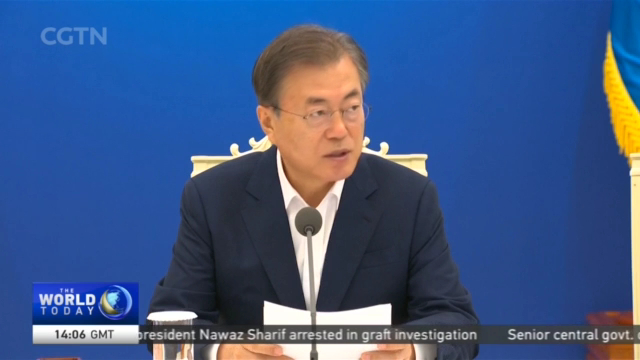
22:31, 08-Aug-2019
South Korea-Japan Trade Row: Seoul braces for impact after Tokyo tightens export rules
Updated
22:50, 08-Aug-2019

Tensions rising between the Republic of Korea and Japan -- Industries in both countries are preparing for a long, drawn-out battle over Tokyo's export curbs on Seoul. Shane Hahm reports.
South Korean industries are on alert. They're prepared to take on Japan, after Tokyo's decision to remove South Korea from its trade white list meaning more scrutiny on all exports to South Korea, including materials used in high-tech machinery and products. And the government is willing to do all it can to support local industries.
MOON JAE-IN SOUTH KOREAN PRESIDENT "Companies that depended heavily on Japanese parts and materials may experience difficulties immediately. But I urge them to look forward and use this as a chance to change our industrial ecosystem. I promise you the government will aggressively support."
No industry looks to be hit harder than South Korea's semiconductor and display panel industry. In early July, Japan restricted the export of three key materials used to make memory chips and display. Semiconductors make up about a fifth of the country's total exports and more than 90 percent of export growth. That's why local suppliers are putting their heads together to overcome the awaiting challenge.
SHANE HAHM SEOUL "Experts here suggest global protectionist trade measures will likely worsen, and now is the time to nurture and develop local small- and medium-sized manufacturers to produce higher-quality parts and materials. That's because up until now, local suppliers lagged behind Japanese competitors in terms of quality, forcing manufacturers to look to and depend on companies abroad."
PARK JEA-GUN, HEAD KOREAN SOCIETY OF SEMICONDUCTOR AND DISPLAY TECHNOLOGY "There's a notion that domestic products are inferior, that semiconductor and display parts need to be number one and cutting edge. That's why we need to raise Korean semiconductor parts, materials, and equipment to global levels."
President Moon is promising to allocate more funding for small businesses. He's confident firms can turn crisis into opportunity and many business owners agree.
RYU JAE-WAN CEO, SBB TECH "So far, we've been chasing Japanese products, but I think we can make products that surpass Japanese products."
Companies like Samsung Electronics say they've stockpiled enough resources to manage production for several months. Localizing the production of materials will take time and know-how. And under the current circumstances, that seems to be the only option. Shane Hahm, CGTN, Seoul.
SITEMAP
Copyright © 2018 CGTN. Beijing ICP prepared NO.16065310-3
Copyright © 2018 CGTN. Beijing ICP prepared NO.16065310-3